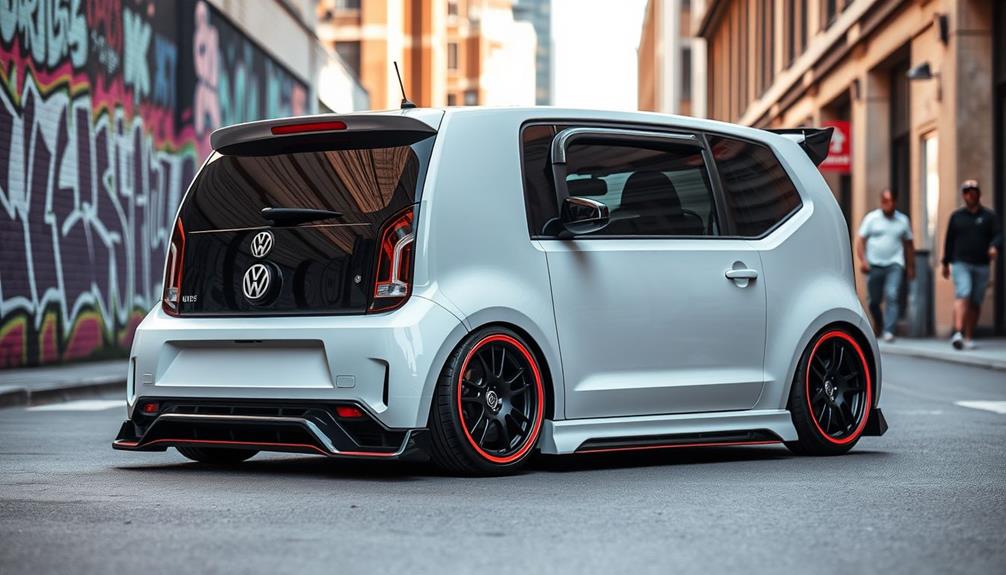Tuning your 2014 Volkswagen Jetta can greatly boost performance and responsiveness. Start with an ECU software upgrade to access your engine's true potential. Consider adding a turbocharger for extra power, but verify proper injector sizing for ideal fuel delivery. Upgrading your exhaust system reduces back pressure, enhancing horsepower. Don't forget suspension upgrades for better handling and brake improvements to match your newfound speed. Budget wisely, accounting for parts and installation costs. Prioritize upgrades based on your performance goals. Keep going to discover more tips that'll make your Jetta a thrilling ride.
Key Takeaways
- Upgrade the ECU for optimized engine performance and improved fuel efficiency when tuning your 2014 Jetta.
- Install a turbocharger for significant power increases, ensuring proper injector sizing and heat management.
- Enhance the exhaust system with a cat-back upgrade to reduce back pressure and improve horsepower.
- Consider adjustable coilovers and quality brake systems for better handling and performance on the road.
- Budget carefully for tuning projects, accounting for parts, labor, and unexpected expenses with a contingency fund.
Overview of Jetta Tuning
When it comes to enhancing your Volkswagen Jetta's performance, tuning offers a world of possibilities. One of the most effective methods is through ECU software upgrades, which can greatly boost your engine's horsepower and torque. By remapping the ECU, you can access the full potential of your Jetta, making it feel more responsive and exciting to drive.
To complement these software changes, consider high-quality aftermarket parts. Upgrading components like the exhaust system and intake can improve airflow, further enhancing performance.
You might also explore suspension enhancements to improve handling and overall driving experience. As you dive deeper into tuning, you'll encounter various stages, from basic modifications to advanced options, including turbocharger installations.
It's crucial to verify that all upgrades are compatible with your Jetta's factory engine management system. Engaging with tuning communities and forums can be incredibly helpful.
These groups provide valuable insights, tips, and resources that can guide you through the tuning process, helping you achieve your performance goals while enjoying the journey of upgrading your Volkswagen Jetta. Additionally, enthusiasts within these communities often share **Volkswagen Beetle tuning tips** that can be applied to a range of models, including the Jetta, highlighting common modifications and best practices. Whether you’re focused on optimizing horsepower, improving handling, or enhancing aesthetics, these shared experiences and collective wisdom make the process more efficient and enjoyable. By learning from others, you can avoid common pitfalls and make informed decisions, ensuring that your car reaches its full potential.
Essential Engine Modifications

When tuning your 2014 Volkswagen Jetta, start by considering ECU software upgrades for a noticeable boost in horsepower and torque.
If you're aiming for significant power increases, think about adding a turbocharger and guarantee you choose the right injector size to match your goals.
These essential engine modifications can transform your Jetta's performance and make your driving experience even more thrilling.
ECU Software Upgrades
Upgrading the ECU software on your 2014 Volkswagen Jetta can dramatically boost engine performance, as it optimizes the factory engine management system for enhanced horsepower and torque.
By remapping the ECU, you can experience smoother power delivery across the RPM range, making your driving experience more enjoyable.
If you're considering performance modifications, proper ECU tuning is vital. Stock ECUs often have limitations that prevent them from fully utilizing your vehicle's potential, especially if you've added aftermarket parts.
In such cases, custom tuning solutions may be necessary to achieve the desired results.
It's essential to consult multiple tuners to find the best custom ECU tuning options suited for your specific performance goals and vehicle setup. They can tailor the software to maximize horsepower while ensuring reliability and efficiency.
The benefits of proper ECU upgrades extend beyond just performance; you might also notice improved fuel efficiency, making it a smart investment for Jetta owners.
Turbocharger Installation Tips
Turbocharging your 2014 Volkswagen Jetta can greatly enhance its performance and driving dynamics, but it requires careful planning and execution. Since no bolt-on kits are available for this model, custom work is necessary.
Start by sourcing a turbo manifold from a MK4 Jetta (1999-2004) to guarantee proper fitment and functionality.
For the turbocharger, a GT28 or similar size is recommended due to your engine's flow limitations. This choice helps you achieve peak performance without putting excessive strain on the engine.
Next, you'll need a universal intercooler piping kit, which should include couplers and T-bolt clamps. This kit is vital for connecting the turbocharger to the intercooler and intake system effectively.
Don't overlook heat management during your installation. Proper heat management is essential to prevent overheating and to guarantee the turbocharger operates efficiently within its performance range.
Take the time to route your piping and place heat shields where needed, maximizing the lifespan of your turbocharger systems.
With the right approach, you can greatly elevate your Jetta's performance while keeping it reliable and fun to drive.
Injector Sizing Considerations
Selecting the right fuel injectors can make or break your tuning project for the 2014 Volkswagen Jetta. If you're targeting around 250 horsepower, you'll want injectors in the range of 380-440cc to guarantee proper fuel delivery.
It's essential to calculate injector sizing based on your desired horsepower and the compatibility of your fuel system. This step helps avoid lean conditions that can jeopardize engine performance.
Larger injectors are important for higher power goals, as they provide the additional fuel necessary for peak combustion efficiency.
However, simply swapping out the injectors isn't enough. Upgrading to larger injectors should always be accompanied by appropriate ECU tuning. This adjustment is critical to accommodate the changes in fuel delivery and maintain engine performance and reliability.
Turbocharger Installation Guide
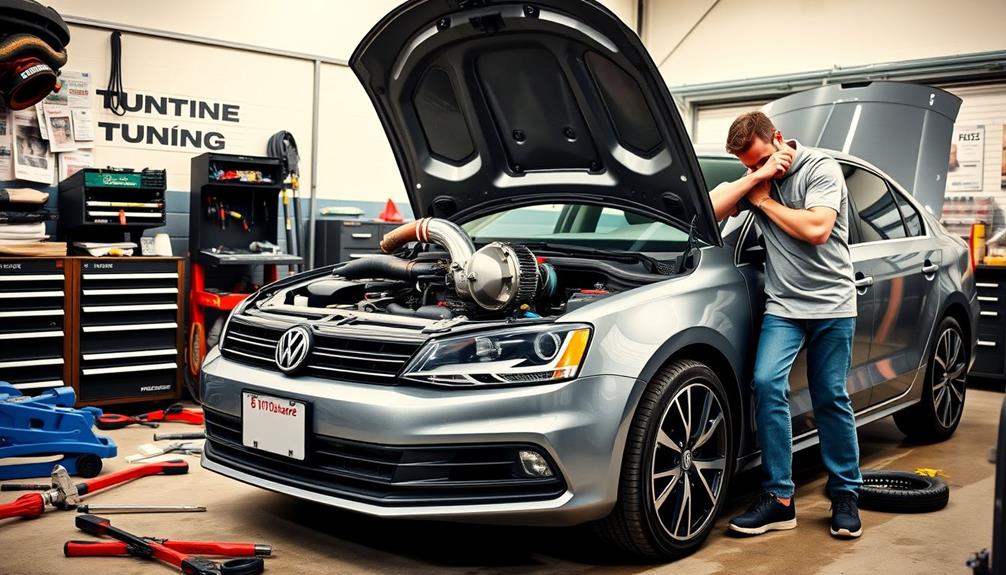
Installing a turbocharger on your 2014 Volkswagen Jetta can greatly enhance its performance, but it requires careful planning and execution due to the lack of bolt-on kits for the MK6 2.0 8V engine. You'll need to source a turbo manifold from the MK4 Jetta (1999-2004) and a GT28 turbo or a similarly sized option for peak performance.
For the installation, here's a quick overview:
| Component | Details |
|---|---|
| Turbo Size | GT28 or similar |
| Intercooler | Mk6 GLI intercooler |
| Piping Kit | Universal intercooler piping kit |
| Downpipe | Custom downpipe from an exhaust shop |
| Installation Check | Secure all connections properly |
To accommodate the new turbo, make sure you have a universal intercooler piping kit, including couplers and T-bolt clamps. Proper installation is essential to avoid leaks and maintain efficient operation of your turbo system. With the right components and attention to detail, you'll transform your Volkswagen Jetta into a powerful and responsive machine. Happy tuning!
Choosing the Right Intercooler
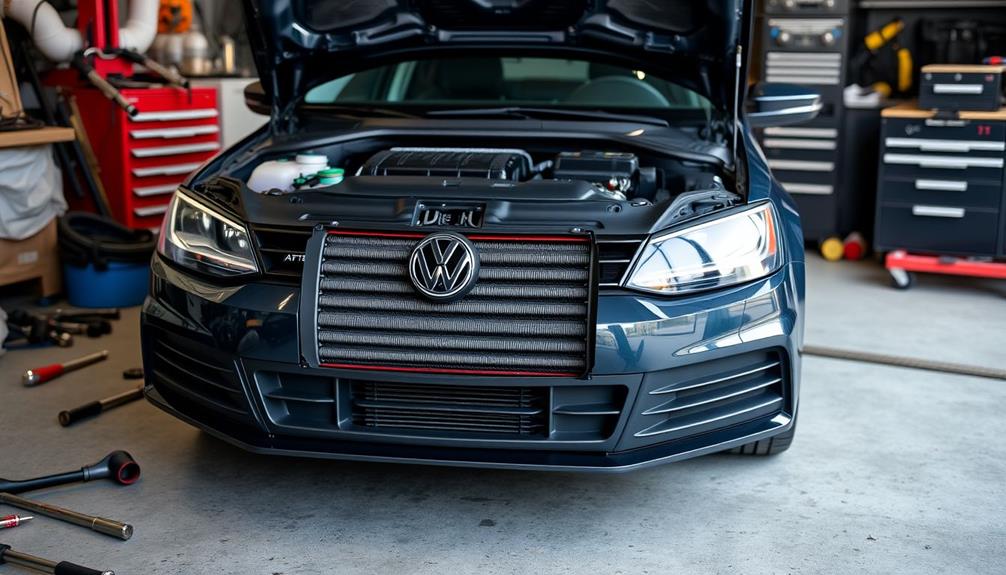
Performance is essential when it comes to tuning your 2014 Volkswagen Jetta, and choosing the right intercooler plays an important role in achieving that. The Mk6 GLI intercooler is your best option, offering improved cooling efficiency that enhances performance considerably. A well-chosen intercooler can reduce intake temperatures, boosting both turbocharger effectiveness and overall engine efficiency.
As you upgrade, don't forget to invest in a universal intercooler piping kit, which comes with couplers and T-bolt clamps. This kit is critical for securely connecting the intercooler to your turbocharger and engine. Ensuring that all piping and connections are tight is essential; leaks can lead to performance losses and potentially damage your engine.
Additionally, consider implementing heat management solutions, like heat wrap or heat shields. These tools will optimize your intercooler's effectiveness while protecting surrounding components from excessive heat.
Exhaust System Upgrades
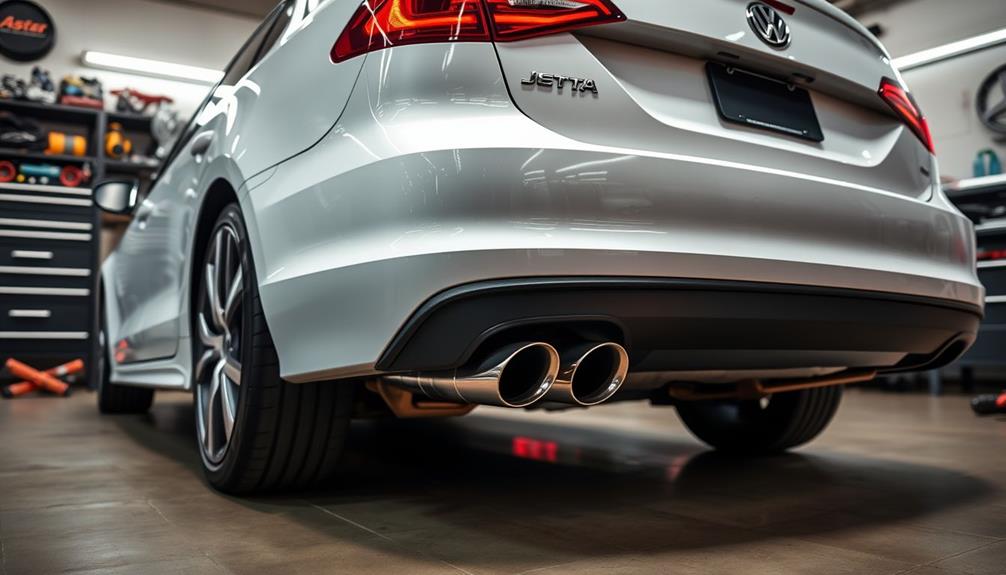
Upgrading your exhaust system can make a noticeable difference in your 2014 Volkswagen Jetta's performance and sound. A high-performance exhaust system reduces back pressure, leading to improved horsepower and torque.
For many enthusiasts, a cat-back exhaust system is the go-to choice, as it replaces everything from the catalytic converter back, delivering significant performance gains.
When selecting exhaust systems, consider a larger diameter pipe—typically between 2.5 to 3 inches. This increase enhances exhaust flow, which is essential for maximizing engine efficiency.
Performance aftermarket products often come with less restrictive mufflers, promoting better sound quality while still complying with local noise regulations.
Don't forget that regular maintenance is crucial after your upgrade. Confirm you check for leaks and secure all connections to maintain ideal performance and longevity.
By investing in a quality exhaust system, you're not just improving your Jetta's sound; you're also enhancing its overall driving experience.
With the right upgrades, you can enjoy the thrill of a more powerful and responsive sedan.
Injector Sizing Considerations

When you're aiming for around 250 horsepower in your 2014 Volkswagen Jetta, selecting the right injector size is vital.
You'll need to calculate the ideal injector size based on your power goals and make sure it's compatible with your fuel system.
Getting this right not only maximizes performance but also helps prevent issues that could damage your engine.
Target Horsepower Goals
Achieving your target horsepower goals with a 2014 Volkswagen Jetta hinges considerably on proper injector sizing. If you're aiming for around 250 hp, you'll typically want injector sizes in the range of 380-440cc. This guarantees ideal fuel delivery and helps you reach your performance targets without compromising engine performance.
It's vital to take into account your fuel system's compatibility with the chosen injectors. Mismatched injector sizes can lead to issues with fuel pressure and delivery, which can hinder your modifications' effectiveness.
For those looking to push past 250 hp, larger injectors may be necessary, so careful calculations based on your specific setup are essential.
Proper injector sizing isn't just about hitting your horsepower target; it also plays a significant role in maintaining reliability and overall engine performance.
Regular monitoring of injector performance and fuel system conditions will help you enhance your engine's efficiency and power output after modifications. By paying attention to these details, you can guarantee that your Jetta delivers the performance you desire while remaining dependable on the road.
Injector Size Calculation
Calculating the right injector size for your 2014 Volkswagen Jetta is vital for ensuring ideal fuel delivery and performance. If you're targeting around 250 horsepower, you'll want to take into account fuel injectors in the 380-440cc range. This size provides adequate fuel flow, meeting the demands of your engine while maintaining efficiency.
Keep in mind that larger injector sizes may be necessary if you're aiming for higher horsepower goals. These larger injectors boost fuel flow, which is important for peak engine performance. However, you must be cautious; improper sizing can lead to lean or rich fuel mixtures, which can harm your engine's efficiency and longevity.
To accurately calculate the injector size, take into account factors like your desired horsepower, the type of fuel you'll be using, and your Jetta's overall engine efficiency. Each of these elements influences how much fuel your engine needs to perform at its best.
Fuel System Compatibility
Making sure your fuel system is compatible with your chosen injectors is essential for peak performance. When upgrading your Volkswagen Jetta's fuel injectors, keep in mind that proper sizing is critical. If you're targeting around 250 horsepower, opt for injectors in the range of 380-440cc for adequate fuel delivery.
Here are some key considerations:
- Injector Size: Choose injectors that match your power goals; larger injectors may be necessary for higher horsepower targets.
- Fuel Pump Capability: Confirm your fuel pump can handle the increased flow from upgraded injectors to maintain fuel system compatibility.
- Fuel Lines: Make sure your fuel lines can support the additional fuel delivery without risk of leaks or pressure drops.
- Fuel Type: Consider using higher octane gasoline to fully utilize the benefits of your new injectors and achieve peak engine performance.
Custom ECU Tuning Options

When it comes to releasing your 2014 Volkswagen Jetta's true potential, what custom ECU tuning options are available?
Custom ECU tuning can markedly enhance engine performance by optimizing fuel maps and ignition timing, resulting in improved horsepower and torque. You can choose between remapping the stock ECU or installing a standalone ECU, with the latter offering more flexibility for high-performance modifications.
To find the right tuning solution tailored to your specific performance goals, it's vital to consult multiple tuning specialists. They can help you determine the best approach based on your desired outcomes and vehicle setup.
Effective ECU tuning not only boosts performance but also guarantees smoother power delivery across the RPM range, helping you achieve gains without compromising reliability.
Keep in mind that budgeting for ECU tuning is critical, as costs can vary widely based on the complexity of the process and the expertise of the tuner involved.
Suspension and Handling Enhancements

To truly elevate your 2014 Volkswagen Jetta's performance, focusing on suspension and handling enhancements is key.
By making the right upgrades, you can greatly improve your driving experience. Here are some expert tips:
1. Adjustable Coilover Kits: Upgrading to these kits allows you to customize your ride height and stiffness, optimizing your Jetta's handling on various terrains.
2. Polyurethane Bushings: Replacing the OEM rubber bushings with polyurethane alternatives increases durability and tightens handling.
Just be prepared for a firmer ride.
3. Alignment Adjustments: Implementing negative camber and toe adjustments of 1 to 1.7 degrees can notably enhance cornering performance, making your turns more responsive and controlled.
4. Quality Brake Systems: While you're focused on suspension, make sure your brake system can keep up.
Consider larger discs and high-friction pads to maintain stopping power during spirited driving, complementing your suspension upgrades.
Brake Upgrades for Performance
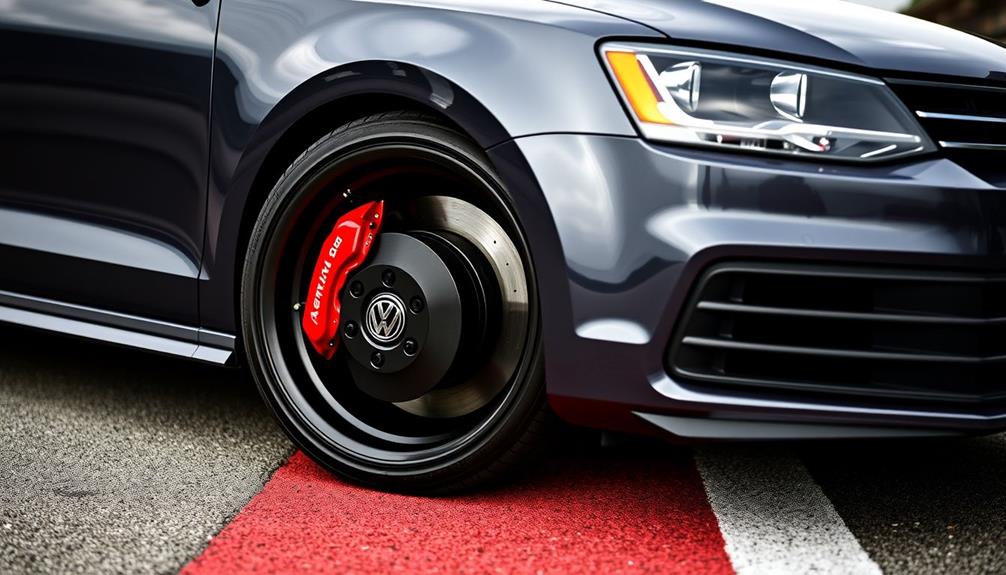
Upgrading your 2014 Volkswagen Jetta's brake system can dramatically enhance your stopping power and overall driving confidence. One effective way to do this is by installing larger brake discs. Opt for vented discs which improve cooling efficiency by increasing air exposure, ensuring consistent performance.
High friction brake pads are essential for peak performance, though keep in mind they may generate some noise and dust. If you're looking for maximum performance, consider racing pads, but be aware they work best at high temperatures and aren't suited for daily driving.
You can also interchange components from compatible brands like Audi, Porsche, Skoda, and Seat to further elevate your braking system. Upgraded calipers and rotors from these brands can greatly improve braking performance.
Drilled brake discs are another excellent option as they help maintain pad cleanliness and reduce gas buildup, resulting in more consistent braking under various conditions.
Lastly, increasing the number of pistons in your calipers will enhance clamping power, providing a more responsive and effective braking experience.
With these upgrades, you'll notice a marked improvement in your Jetta's stopping power and overall safety.
Budgeting for Your Project

When you're budgeting for your Jetta tuning project, start with an estimated cost of around $3,000, keeping in mind that this can rise with professional help.
You'll need to evaluate expenses for various upgrades—like engine enhancements and suspension tweaks—each adding to your total.
Don't forget to factor in the potential costs of custom tuning and ongoing maintenance, as these can greatly impact your budget.
Estimated Project Costs
Budgeting for your 2014 Volkswagen Jetta tuning project is vital, and you should expect to start with an estimated cost of around $3,000. This baseline can rise considerably, depending on the choices you make along the way.
Here's a breakdown of potential costs:
- ECU Tuning: Custom solutions from tuners can add substantial expenses to your project.
- Supporting Modifications: Upgrades like injectors, exhaust systems, and intercoolers can range from hundreds to thousands of dollars.
- Professional Installation: Opting for expert installation guarantees quality but can dramatically increase your budget.
- Labor Costs: If you require custom fabrication for parts like downpipes or turbo installations, labor costs can escalate quickly.
When budgeting, remember to account for all these elements to avoid overspending.
Planning for the entire project, including parts, labor, and unforeseen expenses, is vital for a successful tuning outcome.
Essential Budget Considerations
Planning for your 2014 Volkswagen Jetta tuning project involves careful consideration of various budget factors. Start with a baseline of at least $3,000 for basic modifications, but be prepared for costs to rise if you need professional installation.
One of the biggest expenses will likely be ECU tuning, which can range from several hundred to over a thousand dollars for custom solutions.
Don't forget to budget for performance parts as well. Aftermarket components like intakes, exhaust systems, intercoolers, and injectors typically cost between $200 and $1,500 each.
As you plan, keep in mind that some modifications may require additional maintenance or replacements, adding to your overall budget.
Setting aside a contingency fund of 10-20% of your total project cost is wise, as unexpected expenses can pop up during the tuning process.
By carefully considering these essential budget elements, you'll be better equipped to navigate your Jetta's tuning journey while ensuring you stay within your financial limits.
Prioritize your modifications, and you'll enjoy a thrilling ride without breaking the bank.
Frequently Asked Questions
How to Increase Horsepower in a Jetta?
To increase horsepower in your Jetta, consider upgrading the ECU with a performance tune, installing a high-flow intake and exhaust, using larger fuel injectors, and possibly adding a turbocharger for significant gains.
How Much Does It Cost to Get a Tune up on a Volkswagen Jetta?
You might think a tune-up's cheap, but it can range from $100 to over $2,000, depending on services and upgrades. Be ready for extra costs if you're eyeing performance enhancements or dealership services.
How Do I Change My Jetta to Mph?
To change your Jetta to mph, navigate through the instrument cluster settings using your steering wheel controls. Look for the "Settings" or "Vehicle" menu. If you can't find it, consult the owner's manual for guidance.
How Fast Is the 2014 Jetta Se?
Like a cheetah on the hunt, your 2014 Jetta SE reaches a top speed of around 130 mph. With its turbocharged engine, it offers a thrilling drive that balances performance and efficiency seamlessly.
Conclusion
Upgrading your 2014 Volkswagen Jetta can transform it from a reliable sedan into a performance powerhouse. By focusing on engine mods, turbocharging, and handling enhancements, you'll breathe new life into your ride—think of it as giving your Jetta a shot of nitrous in a world that's all about electric cars. With careful planning and the right upgrades, you'll enjoy an exhilarating driving experience that'll turn heads on the road. So, what are you waiting for?



